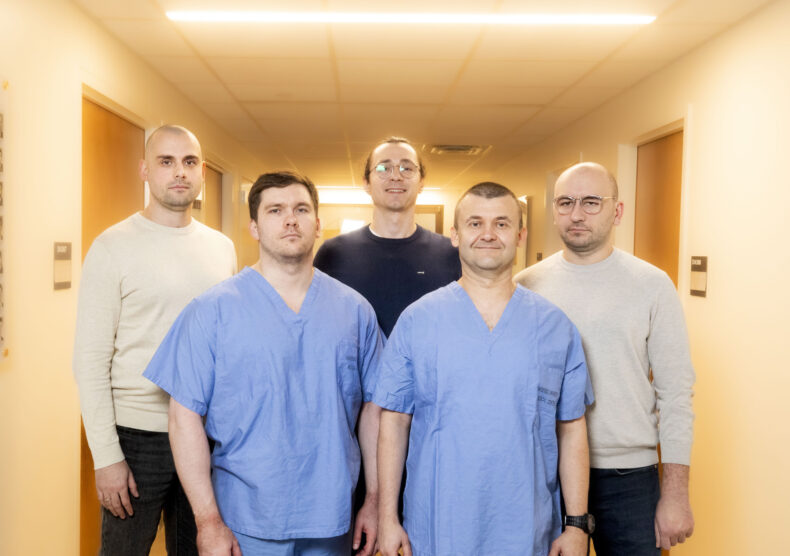
by Matt Batcheldor
For the second year, a delegation of doctors from Ukraine recently visited Vanderbilt University Medical Center to observe organ transplants and protocols.
With the help of Vanderbilt and other transplant centers, Ukraine has developed a growing transplant program in the country in the last three years, said Borys Todurov, MD, a Ukrainian cardiac surgeon and director of The Heart Institute in Kyiv, who performed the nation’s first heart transplant. Historically, Ukraine’s transplant programs have been underdeveloped, as citizens needing transplants would typically leave the country for hubs such as India and Belarus. But having a program in-country has become critical since travel became much more difficult after Russia invaded Ukraine in February 2022.
Now the nation has performed more than 80 heart transplants and more than 100 kidney and liver transplants and recently completed the nation’s first heart-lung transplant, Todurov said. It has also begun a pediatric transplant program that has performed six heart transplants for children, the youngest of whom was 6 years old, and is working on developing a lung transplant program.
The five-doctor Ukrainian delegation, which visited from Nov. 6-17, was comprised of Todurov; cardiac surgeon Sofia Chaikovska, MD; intensivist Igor Kuzmych, MD; anesthesiologist Mykola Melnyk, MD; and perfusionist Serhii Sudakevych, MD.
Observing large transplant centers such as the Vanderbilt Transplant Center is vital for the Ukrainian doctors, because such procedures require a large, multidisciplinary team using complex techniques, from obtaining donor organs to completing transplants. It is important for the team to not only witness the transplant surgeries themselves but understand the protocols that surround them. That includes how to determine who is a good candidate for a transplant, how to keep patients alive during transplants using extracorporeal life support, and how to manage patients post-transplant with frequent laboratory tests and a balance of multiple medications.
“We come here because today we need to develop … we need to get new technologies, which we can get only in America or European countries, and we come to study,” Todurov said. “Vanderbilt is one of the best hospitals in the world. Our colleagues are very kindly, very friendly and they share with us all the knowledge they have.”
The Ukrainian team didn’t wait long to observe. On the day the delegation arrived, it witnessed four heart transplants. The team has observed all aspects of transplantation — from traveling to observe surgeries to obtain donor organs, preserving the organs in transit and the transplants themselves at VUMC.
These same doctors have been performing surgeries in dark hospitals in Ukraine as power grids have been shattered by war. They have treated thousands of wounded soldiers and civilians and slept for months in bomb shelters with their children and families and pets, determined to stay in their country and continue to save lives.
The war continues to affect Ukrainian medical teams daily, Todurov said. Alarms sound every day to usher people into underground shelters, and power blackouts are constant. A year into the war, doctors are not only treating the acutely wounded but increasingly individuals with post-traumatic stress syndrome, those who have lost their homes, children and way of life.
“It is truly an honor to host our Ukrainian transplant colleagues,” said Joseph Magliocca, MD, professor of Surgery and director of the Vanderbilt Transplant Center. “Not only do they bravely continue to risk their own lives in the name of patient care, but they also do it under conditions that most would consider unimaginable. Despite working in a war zone with a severe lack of resources, they continue to serve needy patients while still achieving excellent outcomes and continuing to try to improve care. We are excited and humbled to work with such an amazing group of physicians.”
This transplant surgery experience exchange program between Vanderbilt and Ukraine was launched in 2022 through the Peace and Development Foundation; former U.S. Sen. Bill Frist, MD, founding director of the Vanderbilt Transplant Center; and leadership of the Vanderbilt Transplant Center.
“We really appreciate the Tennessee medical community being so welcoming and responsive to support our nation’s resilient fight for its freedom, independence and right to exist,” said Rostyslav Semikov, MD, founder of the Peace and Development Foundation.
Seth Karp, MD, H. William Scott Jr. Professor and chair of the Section of Surgical Sciences, said, “Our Ukrainian friends continue to inspire us with their commitment and dedication – taking care of patients with great personal risk amidst bombs falling daily. We look forward to growing our relationship over time and look forward to the day they can serve their patients without duress.”











